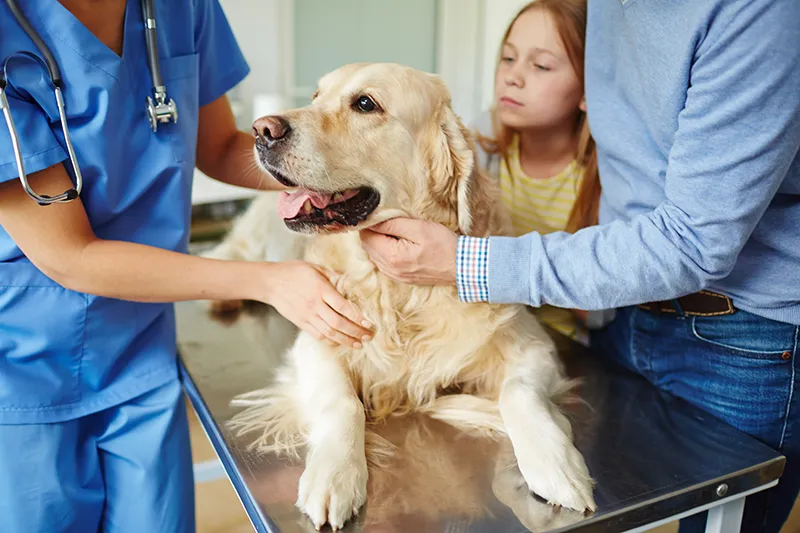Accidents happen, and when it comes to our pets, quick thinking and fast action can make all the difference in an emergency. At Galena Animal Medical Clinic in Middletown, DE, we understand how stressful pet emergencies can be. Whether your pet is injured, ill, or acting unusually, it’s crucial to know how to respond quickly and appropriately to ensure their health and safety.
In this blog, we’ll walk you through the essential steps to take during common pet emergencies, explain how to handle them until professional help is available, and what actions you can take to keep your pet calm in a stressful situation.
Common Pet Emergencies
Pet emergencies can vary in severity, but they all require quick thinking and a level-headed response. Here are some of the most common types of pet emergencies and what to do when they occur:
1. Choking or Blocked Airway
Choking is a serious emergency where a pet’s airway is blocked, often by food, a toy, or a foreign object. Symptoms include gagging, coughing, difficulty breathing, and distress.
What to Do:
- Stay calm: Keep yourself composed to help your pet stay calm as well.
- Mouth examination: If possible, check your pet’s mouth to see if you can see the object. If it’s visible and easily reachable, gently remove it.
- Heimlich maneuver (for dogs): If the object is not visible and your dog is still choking, apply the Heimlich maneuver by placing your hands just below their ribcage and giving quick, upward thrusts to force the object out.
- Seek immediate vet help: Even if the object is dislodged, contact your vet immediately to ensure no harm was done to the airway or organs.
2. Bleeding and Wounds
Minor cuts to severe lacerations can happen during a pet emergency, and the amount of blood loss can be alarming.
What to Do:
- Apply pressure: If your pet is bleeding, use a clean cloth, bandage, or gauze to apply gentle pressure to the wound. Hold pressure for at least 5-10 minutes.
- Elevate the injury (if possible): If the injury is on a limb, elevate it to reduce blood flow and slow the bleeding.
- Monitor the wound: If the bleeding doesn’t stop after applying pressure, or if it’s severe, rush your pet to the vet for emergency care. If the bleeding is minor, apply a sterile bandage to keep the wound clean.
3. Heatstroke
Heatstroke is a dangerous condition that occurs when a pet is exposed to excessive heat and their body can no longer regulate its temperature. It’s most common in hot weather or when pets are overexerted, and it can be life-threatening.
What to Do:
- Move to a cooler place: Immediately move your pet to a cooler, shaded area away from the heat source.
- Cool them down gradually: Offer your pet small amounts of water and gently wet them with a cool (not cold) cloth. Focus on their paws, belly, and ears, as these areas are sensitive to temperature.
- Seek emergency veterinary help: Heatstroke can cause organ damage, so it’s important to seek professional care even if your pet starts to recover.
4. Seizures
Seizures can be caused by various factors, including illness, toxins, or injury. During a seizure, a pet may collapse, have muscle tremors, or make uncontrollable movements.
What to Do:
- Keep your pet safe: Move any objects or furniture away to prevent your pet from hurting themselves during the seizure. Don’t try to restrain them.
- Time the seizure: If possible, note how long the seizure lasts. This information can be helpful for your vet.
- Stay calm and avoid panic: Do not put your hands in your pet’s mouth, as this can lead to injury. Once the seizure stops, keep your pet comfortable and monitor them closely.
- Seek veterinary care immediately: If the seizure lasts longer than 2 minutes, or if your pet has multiple seizures in a short period of time, seek emergency veterinary care.
5. Poisoning or Toxin Ingestion
Pets can accidentally ingest harmful substances, including household cleaners, chocolate, certain plants, or human medications. Poisoning is a serious emergency that requires prompt attention.
What to Do:
- Contact your vet immediately: If you suspect your pet has ingested something toxic, call your vet or an emergency animal poison hotline right away. Be ready to provide details of what your pet ate and how much.
- Do not induce vomiting without guidance: Some toxins can cause more harm if vomiting is induced, so always consult with a vet before attempting to make your pet vomit.
- Monitor symptoms: Symptoms of poisoning may include vomiting, drooling, diarrhea, lethargy, or changes in behavior.
6. Fractures or Bone Injuries
Pets that experience trauma, such as being hit by a car or falling from a height, may suffer fractures or bone injuries.
What to Do:
- Limit movement: If you suspect a bone injury, try to limit your pet’s movement as much as possible. You can use a towel or blanket to gently lift them if necessary.
- Support the injured area: If the injury involves a limb, try to stabilize it by using a splint or similar object, but avoid applying pressure to the injury.
- Get to the vet quickly: Fractures should be assessed by a veterinarian as soon as possible to determine the best course of treatment.
You may need to perform first aid before your pet can travel. The Red Cross has a great pet first aid app. You can find it on app stores here for Android and here for Apple users. Or, just text “GETPET” to 90999.
Steps to Take in All Pet Emergencies
In any emergency situation, it’s important to remain calm and act quickly. Here are some additional steps to take when handling any pet emergency:
- Call ahead: If possible, call your vet or an emergency animal clinic while you’re en route. This allows the medical team to prepare for your arrival and ensures your pet receives quick care.
- Stay calm: Pets can pick up on their owner’s emotions. Remaining calm helps your pet stay more relaxed.
- Know when to call for help: Some emergencies require immediate veterinary attention, especially if the situation is severe or life-threatening.
Visit the ASPCA site here for more helpful information about pet emergencies.
Frequently Asked Questions
1. How do I know if my pet needs emergency care?
If your pet’s condition involves bleeding, difficulty breathing, unresponsiveness, severe pain, or ingestion of toxins, you should seek emergency care immediately. When in doubt, it’s always best to err on the side of caution and contact a veterinarian.
2. Can I treat my pet’s injury at home?
Minor injuries, such as small cuts or scrapes, can be cleaned and bandaged at home. However, more serious injuries, like broken bones, severe bleeding, or suspected poisoning, require immediate professional care.
3. What should I do if my pet has a seizure?
If your pet is having a seizure, stay calm and protect them from injury. Time the duration of the seizure and seek veterinary care as soon as possible, especially if the seizure lasts longer than 2 minutes or recurs quickly.
4. Can I use human medications in a pet emergency?
No, never use human medications on your pet unless instructed by a veterinarian. Some human medications can be toxic to pets, even in small doses. Always consult your vet before giving your pet any medication.
5. How can I prepare for a pet emergency?
Keep your vet’s contact information handy, and consider having an emergency kit with first aid supplies, such as bandages, antiseptics, and the phone number for an emergency pet clinic. Click here to explore another blog about critical pet care: this one is for exotics.
Contact Our Middletown, DE Vet Clinic
At Galena Animal Medical Clinic in Middletown, DE, we know that your pet’s health and safety are your top priority. By knowing how to handle pet emergencies and responding quickly, you can provide the best care and give your pet the best chance for a positive outcome. Always keep your vet’s contact information on hand and stay calm during stressful situations.
If you need guidance or have concerns about your pet’s health, don’t hesitate to reach out to us. Our team is here to help when you need us most!
Click here to visit our Service page and find out more about our clinic and the animals we treat. You can also go here to learn more about our Critical Care services, or go here to learn more about our Exotic Pet care offerings.
This blog is meant to be informational only. Always consult with your veterinarian for the right medical advice, diagnosis, or treatment plan for your pet and follow their advice.







!Social Media Icons